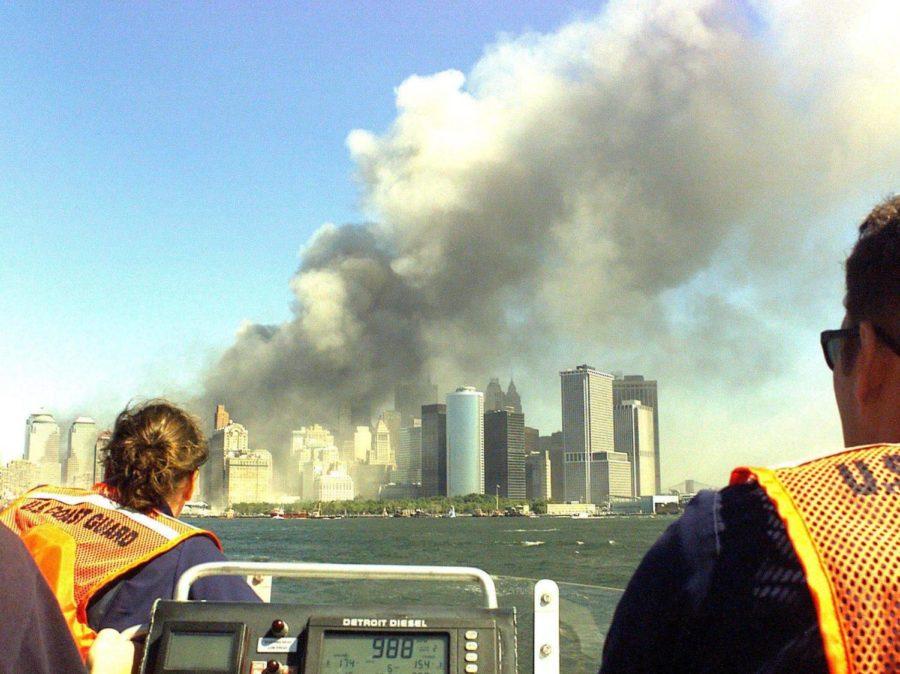Guest Column: Significant policy changes triggered after 9/11
File photo: Courtesy of Tom Sperduto/US Coast Guard via MCT
A Coast Guard rescue team from Sandy Hook, N.J., races to the scene of the World Trade Center terrorist attack, September 11, 2001.
September 8, 2011
I remember Sept. 11, 2001, when a staff person in Catt Hall said to me, “Oh, by the way, did you hear that a plane crashed into the World Trade Center in New York?”
When a second plane crashed into the second tower, we knew it was an act of war. I also knew that life would not be the same after that.
Already airport security was tight, there had been an earlier and unsuccessful terrorist attack with a truck bomb on the towers, and terrorism was on the rise worldwide.
The 2001 attacks were so monumental because they were the first time since independence that an enemy had successfully hit the mainland of the United States. The fortress had been breached. The psychological impact of something the Germans and Japanese never accomplished in World War II was traumatic.
I believe the three biggest consequences of Sept. 11 are on national security, civil liberties and the economy.
National security
Of course, national security became “homeland security” very quickly, a concept we had never used and that always sounded to me like the German “Vaterland” — fatherland, a very nationalistic term. Quickly, a massive new cabinet level department, the Department of Homeland Security, was created that incorporated many previously independent and specialized government programs including the Coast Guard and immigration.
The federal government has never been a very coordinated organization. In matters of counterterrorism, this proved to be fatal on Sept. 11 because data sharing about terrorist and threats was uncoordinated, and in many cases, even databases were contracted separately by government agencies and they were unlinked and unsearchable. When you see NCIS agents in the TV series or government spooks in the “Bourne Identity” movie having complex computerized access to almost any piece of information they need, you are watching what should be, not what was or even is today.
Civil liberties
The impact of 9/11 as it’s come to be known on civil liberties is profound. In the days and months after the attack, American public opinion changed drastically, with people in unprecedented numbers saying in polls that they did not mind giving up privacy for the country and themselves to be protected against terrorism. Ideas about due process also changed abruptly, with people saying, “I don’t care if I’m searched, I didn’t do anything wrong. I’m innocent.” Before, the authorities had to have reasonable cause and a search warrant to do so. Now, it seemed Americans were giving up most of that very precious right to be left alone by government except in unusual circumstances.
The Patriot Act and warrantless searches as well as intrusion and inspection of email, Internet activity, telephone and wireless (cellphone) traffic grew sharply and to a large extent has continued to expand government authority in the 10 years after that terrible attack. Airport searches progressed as new terror attempts were uncovered — a “shoe bomber” meant take off your shoes at airports; attempted liquid bombs led to the ban on taking liquids except in small quantities through security; the “underwear bomber” required even more intrusion. That could have led to stripping out your underwear in the security line, but fortunately technology came along and all it means is a machine that can see all of your body through clothes as if you were naked. On Sept. 10, 2001, that would have been thrown out by the courts.
Economy
The American economy also has dramatically shifted from a peacetime economy to practically wartime one. The wars in Afghanistan and Iraq were both direct consequences of 9/11. It grows every millisecond, but so far $1,248,329,561,282 has been spent on these wars. Add to all of the domestic security measures, expenses and inconveniences and you can only imagine what could have been done with that in reducing the debt, rebuilding crumbling infrastructure and funding research to keep us competitive with India, China and others.
Finally in the area of politics, 9/11 changed the entire dialog. Defense spending cuts are now virtually off-limits and our political energy is directed at protecting ourselves from future terrorist attacks rather than setting our own priorities.
Some say that with all of these changes in our way of life the terrorists have won. I disagree. I think we continue to value the same principles as before. We are a much more patriotic country, and rarely have so many American flags flown from homes, stores and buildings. But we have paid a huge price. Our dead and injured have sacrificed so much in these 10 years that it’s our responsibility to work as hard as we can to rebuild this country and move us forward into the new millennium with determination, focus, energy and courage. If we don’t, then the terrorists will ultimately have won.







